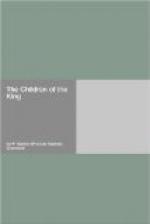“What is the matter?” he asked.
“The rudder is draking, Excellency,” answered Ruggiero.
“And what does that mean?” asked Beatrice.
“It means that the rudder trembles as the boat rises and falls with each sea, when there is a good breeze,” answered Ruggiero.
“Is there any danger?” asked Beatrice indifferently.
“What danger could there be, Excellency?” asked the sailor.
“Because you are so pale, Ruggiero. What is the matter with you, to-day?”
“Nothing, Excellency.”
“Ruggiero is in love,” laughed San Miniato. “Is it not true, Ruggiero?”
But the sailor did not answer, though the hot blood came quickly to his face and stayed there a moment and then sank away again. He looked steadily at the dancing waves to windward, and set his lips tightly together.
“I would like to ask that sailor what he thinks of love and charm, and all the rest of it,” said Beatrice. “His ideas would be interesting.”
Ruggiero’s blue eyes turned slowly upon her, with an odd expression. Then he looked away again.
“I will ask him,” said San Miniato in a low voice. “Ruggiero!”
“Excellency!”
“We want to know what you think about love. What is the best quality a woman can have?”
“To be honest,” answered Ruggiero promptly.
“And after that, what next?”
“To be beautiful.”
“And then rich, I suppose?”
“It would be enough if she did not waste money.”
“Honest, beautiful, and economical!” exclaimed Beatrice. “He does not say anything about charm, you see. I think his description is extremely good and to the point. Bravo, Ruggiero!”
His eyes met hers and gleamed rather fiercely for an instant.
“And how about charm, Ruggiero?” asked Beatrice mischievously.
“I do not speak French, Excellency,” he answered.
“You should learn, because charm is a word one cannot say in Italian. I do not know how to say it in our language.”
“Let me talk about flowers to him,” said San Miniato. “I will make him understand. Which do you like better, Ruggiero, camelias or violets?”
“The camelia is a more lordly flower, Excellency, but for me I like the violets.”
“Why?”
“Who knows? They make one think of so many things, Excellency. One would tire of camelias, but one would never be tired of violets. They have something—who knows?”
“That is it, Ruggiero,” said San Miniato, delighted with the result of his experiment. “And charm is the same thing in a woman. One is never tired of it, and yet it is not honesty, nor beauty, nor economy.”
“I understand, Excellency—e la femmina—it is the womanly.”
“Bravo, Ruggiero!” exclaimed Beatrice again. “You are a man of heart. And if you found a woman who was honest and beautiful and economical and ‘femmina,’ as you say, would you love her?”




